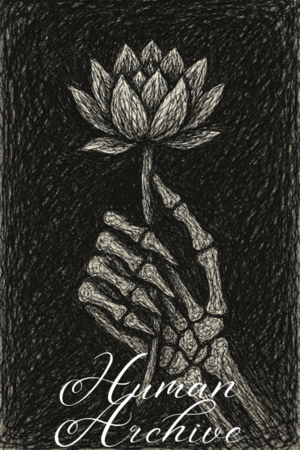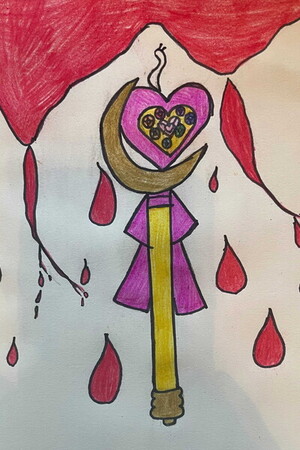Chapter 4:
Act 1: Waltz of Assimilation | Ch. 4: The Poet & The Beast
Human Archive
My weary eyes.
My skin—burnt.
Oxygen seeps through my pores,
devoured by the pantry of space.
My lungs want to burst.
Pop.
Behold the audience:
your puppet’s elegy.
The marionette no longer rises.
No strings.
No gestures.
Nothing at all.
Simple.
I’m so close to the sun.
Gamma rays dance across my iron exosuit—
paint-strokes of space-matter.
Galaxies, universes, planets—
they all hold purpose,
unbothered by the temptations of flame.
But my metal body—
if it burned through,
would I feel it?
Would it tingle like my cheek?
Like the knife wound?
Would my wax wings melt?
Would the audience applaud that?
Cheer for the sacrifice of a pitiful man?
Would they feed on it?
Laugh at it?
For as long as I was human—
before I was too human—
I was beautiful.
Supposed to be beautiful.
I felt it.
A reenactment of that fateful Icarus:
I touched the sunlit skin of humanity—
its fragile balance between harmony and ruin.
Destruction and creation,
swirling as one.
Burning as one.
Building as one.
The planets’ colors mimic my solar system—
but only mimic.
It’s not mine.
Their brilliance is embraced by pure darkness:
a metaphor for individuality
in the brace of meaninglessness.
— ⊹ ⊹ ⊹ —
I’ve escaped the grip of slavery—
yet I repent my individuality.
I’ve seen too much
for anything to make sense.
Before I fold into myself—
tell me…
How did I perform?
Were my every action
guided by the divine script?
Has destiny too been enslaved?
I don’t have to imagine the hands
pulling me toward a planet,
dragging me into a path
already written.
Emotions feel meaningless.
Everything has been chosen.
Manipulated.
Because in the end,
I am a scripted machine
with too much time
in a human world.
The ideal human—
an angel.
The metamorphosis’s true nature.
I was wrong.
The porcelain girl…
she isn’t huma—
— ⊹ ⊹ ⊹ —
Suddenly—
The poet stood. The wooden shack trembled around him, creaking in protest.
He didn’t finish writing the word. He didn’t regret it—but saying it aloud felt dangerous. As if uttering it might splinter the world apart.
In that moment, the figure in the dark frowned. To call her inhuman—she, with her divine grace—was nothing short of heresy. She was beauty incarnate. Angelic in form. Complex in thought. Golden blood veiled behind fragile porcelain.
As if trying to impress the figure hidden beyond all things, the poet turned to the window. A single beam of light pierced through the clouds like a spear. He despised the man responsible for that light—despised him for that phrase—but didn’t show it. He couldn’t. He wouldn’t.
He had a role to play, after all. His part in the script was waiting.
But before he began, he reached for the Xalume pen—a sacred tool of writing, filled with bioluminescent ink. He dipped it deep, over and over, until the glowing fluid smeared across the page, pulsing like a wounded heart.
And then he blotted out the words:
I’ve been wrong,
The porcelain girl isn’t huma—
The windows burst open.
Wind surged into the shack, and for a second the entire room felt like it had taken a breath. The thin curtains flailed like wings. From afar, a hidden pond exploded upward with unnatural force, catching the poet as he stumbled.
For just an instant, hands—soft, invisible, divine—could be seen guiding the beast from the stars down gently.
He was the protagonist of the story. Chosen. Necessary to the script.
The poet moved to the door, twisted the handle and opened the door. Before stepping out, he hesitated.
A subtle frown tugged at his lips—jealousy. Not for power or destiny, but for something simpler. To be held. To be cared for. To care.
He whispered:
“Vaeloria… if this is the price of being human,
then let it go. Burn it all. Let the worries become meaningless.
We’ll dance in the rain,
martyrs of our own selfishness.
Oh… beautiful selfishness.
I won’t hide it.
But for now,
I must.”
His eyes drifted to the adjacent door. Something pulled at him—an instinct. A memory. Maybe a forgotten hobby. A part of himself, left behind.
He almost reached for the handle.
But he didn’t.
He turned away, acting as if nothing had happened.
The shack was small. Two floors. Barely enough room to live. A kitchen. A mudroom. Two bedrooms. One had a desk—his writing room. He descended the creaking stairs, grabbed his hat, and picked up what looked like a worn leather jacket.
Outside, he was greeted by purple-leafed trees that hung like wisteria. Their branches bore glowing pink berries that littered the ground like radioactive confetti. The grass was wild and uneven, stones jutting out of the soil as if trying to escape. Trees burst through the terrain in every direction.
Partway down the path—already carved out long ago, preplanned—the biome shifted.
Now massive blue mushrooms loomed overhead. Strange creatures, like oversized caterpillars, fed lazily on the glowing stalks.
But the poet didn’t stop.
He had seen these visions before. Planned them. Built shrines for them. Worshipped them.
Nothing—not even a sudden shift in the world—could change what had already been scheduled.
The trees in the mushroom forest were pale green, much smaller than the fungi. Their branches bore yellow berries, and the grass darkened beneath them. Daylight thinned out. The sky seemed farther away.
Still, the poet walked on.
The metal beast—the one written into this moment—remained unconscious for another thirty-two minutes. He knew, for he was the visionary—the insane man—and the world has told him.
Then—
exactly thirty minutes before the appointed time—without checking a clock—the poet retrieved a lantern from his satchel. He sparked it to life with a lighter. Instantly, a swarm of bluish fireflies appeared, clicking against the glass.
Each collision sent bursts of blue light scattering through the soil.
He didn’t flinch. The jacket protected him. Its strange material resisted the heat.
He kept walking.
And then, after another twenty five minutes—
Steam rolled in, thick and heavy, blinding his path.
— ⊹ ⊹ ⊹ —
It was hot, like breath. But the motion was soft, silk-like. Stopping now would feel like shattering something sacred. Heresy. Treason. Any more, and he'd have to commit Khal'ruun.
The lantern’s light pulsed through the mist, and the fireflies scattered to the other side. The poet stepped into the center of the storm, onto a dock that stretched across a shallow lake.
There he saw it.
Metal, resting peacefully, half-submerged in water. No damage. No scarring. It looked almost… laid to rest.
Time and space had preserved this moment.
Around him, jagged stones pierced through the green surface of the lake. Small blue fungi grew between them. Birds—Nokravis, known for singing death into the air—remained silent.
From a distance, they looked like cranes. Or doves. Maybe both.
There was no death here.
With every soft step on the wooden planks, the poet approached. The metal beast stirred in response. Slowly. Naturally. As if following the cue.
At the end of the dock, the poet set down the lantern. The fireflies, as if summoned by fate, hovered near its glow.
And just as written—
The metal beast opened his eyes.
One hand rose from the water.
The poet reached out across the narrow divide and grasped it. He pulled the beast from the shallow lake.
And so he did.
As it was scripted.
[End of Chapter]




Please sign in to leave a comment.